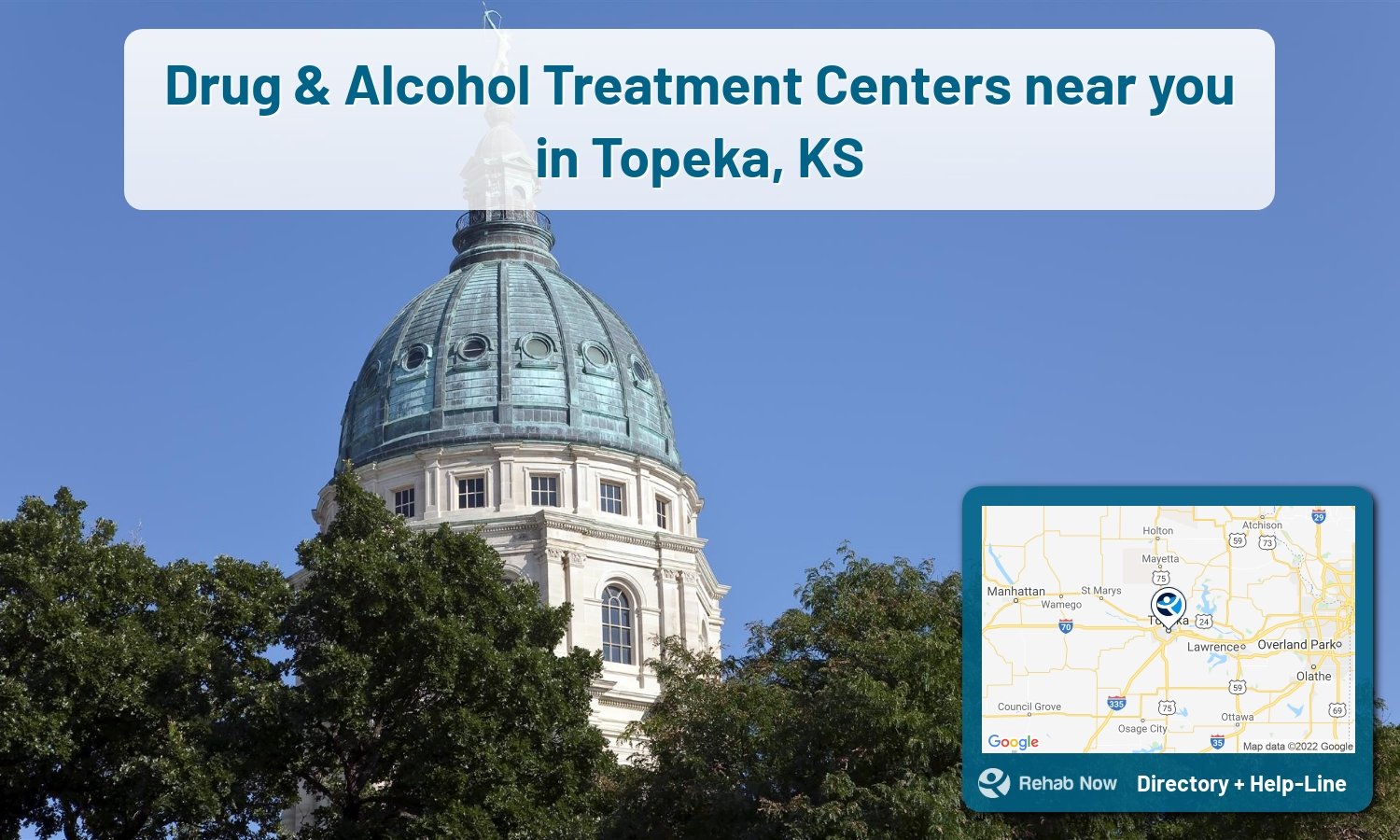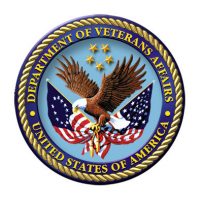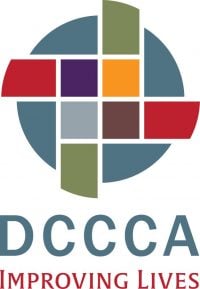Drug & Alcohol Treatment Centers near you in Topeka, KS
Drug abuse is common in people who suffer from mental health issues such as bipolar disorder, depression, and anxiety. Many individuals often misuse illicit substances such as MDMA ( ecstasy ), LSD, methamphetamine, and cocaine to self-medicate their mental health issues.
However, most of these substances are considered dangerous because it can be straightforward to develop a serious addiction. People with drug addiction and mental health issues should seek treatment at one of the rehab centers in Topeka, KS, specializing in dual diagnosis. This will help to treat both issues at the same time.
Suppose you or a loved one is struggling with drug or alcohol addiction. In that case, you should consider getting help at one of the drug and alcohol rehabilitation centers in Topeka, KS, so that you can live a healthy life again.
Here we list Topeka addiction rehab facilities and centers, many with exclusive programs of their own. There is hope for recovery and a new life with a number of drug and alcohol addiction programs available throughout Topeka.
Free Admissions Guidance and Assistance
We will help you find treatment based on your location, budget, and specific needs and help you get started safely.
Free + Confidential Consultation
Browse 32 Centers in Topeka, Kansas

Sunflower Alcohol Safety Action Project
The Sunflower Alcohol Safety Action Project in Topeka, Kansas is a non-profit organization that provides education, counseling, and intervention services for individuals struggling with substance abuse issues.
- 1
- 2
Drug & Alcohol Rehab Facilities near Topeka, Kansas
Drug and Alcohol Treatment in Topeka, KS
If you or someone you know is suffering from drug addiction but don’t think that inpatient treatment is proper for you, check out one of the outpatient treatment programs in Topeka. These facilities are designed to help people get sober without living at the rehab center full-time.
Outpatient treatment provides an affordable solution for those who want sobriety but can’t commit to full-time rehab. With this type of program, you can receive individual counseling and attend support groups while continuing life as usual outside of rehab.
Even though it may be less intensive than other treatments, outpatient care is still effective; it has a high rate of success when paired with individual therapy sessions and participation in self-help groups.

What types of treatment are available in Topeka, Kansas?
There are many addiction treatment programs, including inpatient, outpatient, day-treatment programs, and sober homes. One popular form of addiction is alcoholism; individuals who suffer from alcoholism often need to be heavily monitored by the medical staff. They can quickly become dependent on the substance and suffer from severe withdrawal syndrome if they miss a dose.
The best drugs that help people stop drinking are called opioid antagonists. They block the brain from getting excited by other things like alcohol or benzodiazepines.
Even though addiction is a complex disorder, there are many ways to treat it; it’s important to consider many drugs. Each requires a different treatment method, such as detox, counseling, or medication-assisted treatment.
Drug Abuse Statistics in Topeka, Kansas
The abuse of drugs and alcohol is a significant concern in Topeka, Kansas. According to the National Survey on Drug Use and Health, approximately 9.8% of people in Kansas aged 12 or older had used an illicit drug in the past month. This number is slightly higher than the national average of 8.9%.
- According to data from the El Paso Intelligence Center’s National Seizure System (EPIC-NSS), the number of meth lab seizure events in Kansas rose 48% over the same period, from 101 instances in 2007 to 149 occurrences in 2012.
- The past-month illicit drug use rate in Kansas was 6.71%, slightly lower than the national average of 8.82%.
- In Kansas, the rate of drug-induced fatalities was lower than the national average in 2010.
- According to the latest statistics, over half of all drug rehabilitation admissions in Kansas are for marijuana. Since 2006, the percentage of cocaine admissions has been declining.
Additional Treatment Centers in Kansas
About 42% of adults in Kansas have tried an illicit drug at some point in their lives. 12.4% of the state population uses illegal drugs and 4.5% abuse alcohol in a given year. 15.16% of all deaths in Kansas between 2008 and 2017 were caused by either drugs or alcohol.
Still haven't found the right recovery center? Browse nearby Kansas cities.
- Leawood, KS (59.4 mi.)
- Eskridge, KS (25.5 mi.)
- Wichita, KS (129.3 mi.)
- Concordia, KS (110.0 mi.)
- Poteau, KS (283.7 mi.)
- Fort Scott, KS (100.6 mi.)
- Osborne, KS (161.7 mi.)
- Goodland, KS (321.9 mi.)
- Leavenworth, KS (45.8 mi.)
- Hugoton, KS (333.2 mi.)
- Topeka, KS (2.4 mi.)
- Hiawatha, KS (55.5 mi.)
- Wichita, KS (73)
- Topeka, KS (32)
- Shawnee, KS (28)
- Shawnee Mission, KS (22)
- Kansas City, KS (21)
- Olathe, KS (21)
- Lawrence, KS (16)
- Salina, KS (12)
What should I look for in a Topeka drug treatment facility?
You should find an addiction rehab clinic that offers individualized care and follows evidence-based practices to ensure the highest chance of success. These treatments include cognitive behavioral therapy, contingency management, psychotherapy, and more. It’s also beneficial if the facility provides aftercare services such as sober living homes or halfway houses.
Many people relapse because they don’t have access to alternatives once they complete their treatment program. Higher quality rehab centers offer these additional support programs to prevent relapse from occurring in the first place.
What does it feel like to withdraw from drugs?
Drug withdrawal symptoms often depend on how addictive a certain drug is. For example, withdrawal from opioids can be much more severe than withdrawal from marijuana. Symptoms of drug addiction include irritability, anxiety, depression, fatigue, and insomnia.
Some people may have seizures or tremors when they detox from a drug. This is because their body has become used to having that drug in their system.
What should I expect in an inpatient Topeka treatment center for alcohol abuse?
Well-designed rehab plans will help you overcome your addiction by teaching you how to live without drugs or alcohol. First, you’ll start with an assessment to tell the doctor about your problem with substances. You’ll then receive a personalized treatment plan that can consist of individual therapy sessions and group counseling.
If the doctor prescribes medications for your condition, you’ll learn about their purpose and side effects during your stay. If necessary, your doctor will also create a detox program to manage withdrawal symptoms when they appear.
Treatment Programs in Topeka, Kansas
Intervention services are available through many drug addiction treatment clinics near me if someone is struggling with substance abuse. This service is crucial when an individual’s substance use has harmful effects on their lives or the lives of others around them.
Detoxification services can also be provided as a part of the treatment program and should only be done under close medical supervision. These programs help individuals safely withdraw from drugs and alcohol, ensuring that they don’t experience any life-threatening health concerns or dangerous withdrawal symptoms.
After detox and withdrawal have been managed, rehabilitation services come into play to help change an individual’s feelings about drugs and alcohol so that they never want to use again. Treatment can include counseling, medication-assisted therapies such as methadone or suboxone, 12 step programs, self-help groups such as Narcotics Anonymous (NA), holistic treatments like acupuncture or yoga therapy, massage therapy, etc., depending on your specific needs.
Drug Detoxification & Withdrawal Symptoms
When you stop or decrease using a drug to which your body has become addicted, you will experience withdrawal symptoms. Drug withdrawal symptoms depend on how addictive a particular drug is and can range from mild to severe, including physical and psychological effects. The more the user takes the drug, the less likely they will experience some of the more severe withdrawal symptoms such as seizures or delirium tremens (DT).
The drugs most likely to cause severe withdrawal symptoms are alcohol, opioids (narcotics), benzodiazepines (tranquilizers), and cocaine. Users of hallucinogens like LSD may also experience drug cravings and hallucinations for months after quitting their use. Nicotine is highly addictive but typically does not include severe withdrawal symptoms.
Seizures may occur during the withdrawal process from alcohol and benzodiazepines. At the same time, delirium tremens (DT) is a common symptom of withdrawal from alcohol and causes severe disorientation, confusion, and possible death. Hallucinations may also occur in recovery from stimulants such as cocaine or crystal meth. In most cases, these symptoms can be managed with close medical supervision to ensure the patient’s safety.
Inpatient addiction treatment programs attempt to eliminate drug cravings at their onset by administering drugs that suppress them. This approach is often used for highly addictive medications like opioids and barbiturates with intense withdrawal symptoms. However, there are risks involved in using this method since it’s difficult to predict how an individual will react to these medications, and their use can lead to physical dependence.
Struggling with addiction in Topeka, Kansas? RehabNow helps you find the best treatment center or rehab available. (888) 674-0062.






